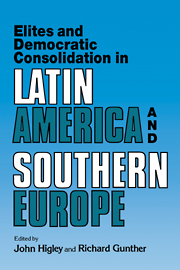Book contents
- Frontmatter
- Contents
- About the contributors
- Preface
- 1 Introduction: elite transformations and democratic regimes
- 2 Spain: the very model of the modern elite settlement
- 3 Elite settlements and democratic consolidation: Colombia, Costa Rica, and Venezuela
- 4 Mexico's elite settlement: conjuncture and consequences
- 5 Elite unification and democratic consolidation in Italy: a historical overview
- 6 The role of civil–military pacts in elite settlements and elite convergence: democratic consolidation in Uruguay
- 7 Patterns of elite negotiation and confrontation in Argentina and Chile
- 8 Elites in an unconsolidated democracy: Peru during the 1980s
- 9 Brazil's political transition
- 10 Redefining the Portuguese transition to democracy
- 11 The Dominican case
- 12 Elites and democratic consolidation in Latin America and Southern Europe: an overview
- Index
1 - Introduction: elite transformations and democratic regimes
Published online by Cambridge University Press: 05 June 2012
- Frontmatter
- Contents
- About the contributors
- Preface
- 1 Introduction: elite transformations and democratic regimes
- 2 Spain: the very model of the modern elite settlement
- 3 Elite settlements and democratic consolidation: Colombia, Costa Rica, and Venezuela
- 4 Mexico's elite settlement: conjuncture and consequences
- 5 Elite unification and democratic consolidation in Italy: a historical overview
- 6 The role of civil–military pacts in elite settlements and elite convergence: democratic consolidation in Uruguay
- 7 Patterns of elite negotiation and confrontation in Argentina and Chile
- 8 Elites in an unconsolidated democracy: Peru during the 1980s
- 9 Brazil's political transition
- 10 Redefining the Portuguese transition to democracy
- 11 The Dominican case
- 12 Elites and democratic consolidation in Latin America and Southern Europe: an overview
- Index
Summary
For all the meanings that “democracy” has acquired, there is broad scholarly agreement that it can best be defined and applied in terms of the procedural criteria that Robert Dahl (1971) has specified: a political regime characterized by free and open elections, with relatively low barriers to participation, genuine political competition, and wide protection of civil liberties. Elaborating Dahl's definition, Juan Linz writes that a political system can be regarded as democratic
when it allows the free formulation of political preferences, through the use of basic freedoms of association, information, and communication, for the purpose of free competition between leaders to validate at regular intervals by non-violent means their claim to rule,… without excluding any effective political office from that competition or prohibiting any members of the political community from expressing their preference. (Linz 1975, pp. 182–3)
This procedural conception of democracy is a demanding “ideal type.” All of its criteria must be approximated closely before a regime can be called “democratic.” Obviously, no real-world regime fits the ideal type perfectly; indeed, many regimes that hold regular elections fall far short. Some regimes tie voting rights to stringent property qualifications, as in most Western countries during the nineteenth century. Some deny the suffrage to whole ethnic categories, as in South Africa or the American South until quite recently. Some outlaw parties that espouse radical ideologies and programs, as has happened to Communist parties in a number of countries. Others marshal majority support for governing parties through corrupt and coercive practices, as the Mexican regime has done for decades.
- Type
- Chapter
- Information
- Publisher: Cambridge University PressPrint publication year: 1991
- 26
- Cited by

